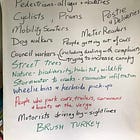Gardeners Rush and Councils Fear
How do you overcome the gap between eager verge gardeners and Councils who decide that it's all too hard to allow anything but grass?
Last week, we talked about Conversations and how they play a vital role in building support for what we are doing.
Conversations have other purposes too. Conversations are for listening, learning, and trying to understand complex situations. Why might that person, or that council, think verge gardens are a bad idea? Why aren’t more people who care about the environment participating? Can’t they see that we just need to get on and do this?
It can take some difficult conversations to find out.
Gardeners Rush…
I’ve been studying disputes over verge gardening since I started my garden in 2017, just before the Buderim Food Street dispute erupted. Now I can often tell from listening to someone whether they are likely to get into a dispute. These are some warning signs.
Too Much Enthusiasm
Rushing in to verge gardening can get you into all sorts of trouble. Enthusiastic verge gardeners are impatient with research and council policies. They get in disputes with neighbours and councils, they plant and are heartbroken to find their plants stolen or stomped on, they plant the wrong plants and create a garden that takes a lot of maintenance or sends invasive weeds into our wider environment.
Too Narrow a Focus
These gardeners want to see neighbours sharing food grown on the verge, or native gardens planting for biodiversity and pollinator strips. Their single cause is more important than anything else. Even if they don’t upset anyone, others aren’t often inspired to follow their lead.
Too Expert
Some of the people who find verge gardening most challenging are people with a lot of expertise in their field. Their institutional and disciplinary lenses shape their understanding of the issues and their views of the priorities and other people involved. Because this space has so many diverse users and uses, disciplines and sectors come crashing together. Nobody is the expert.
Instead, we all come with varying knowledge and expertise that can contribute but it is an ongoing learning experience for everyone. It is the “swampy lowlands” where we can nurture innovative collaborations with truly diverse participants.
… and Councils Fear
The refusal of many councils to allow anything but grass is the classic administrative response described in the Tragedy of the Commons. It’s simply too hard to manage with all these residents and the disputes they will cause.
For verge gardens, that means stopping people planting silly things, stop them damaging street trees, causing trip hazards and other safety issues, getting into disputes with their neighbours, or excluding others from public space. I’ve seen well-intentioned gardeners do all of these.
Verge garden policies are about avoiding these obvious risks, managing competing needs in a complex and crowded space, and avoiding costly disputes. And once you have a policy, you have to get people to read, understand, and follow it. Is it any wonder that many Councils decide that allowing verge gardening is not worth the effort, or simply too hard?
Finding the Middle Ground
Between the individual gardeners and the Councils is civic society - groups of people who come together over a shared interest, and the networks that connect them. These community groups are the key to making verge gardening work for everyone, and make them scale outwards at the rate we need to help address climate change, biodiversity loss, and urban heat.
Anyone who has been part of managing a community group of volunteers knows that it is not easy. For verge gardening, groups are the connectors and interpreters between councils and individual residents.
The resources of The Shady Lanes Project are intended to help groups navigate this space. The skills, resources, and contacts they accumulate doing a group verge garden project can be used for other projects, and for the creation and management of diverse collaborations.
If we can learn to collaborate on this local commons, we could use those same skills, habits, relationships, and networks, to collaborate on even bigger challenges, including our global commons.







Every council policy is different - except the councils who don't allow verge gardening at all.
A list of the policies I know of is here. Please let me know if I've missed yours https://shadylanes.com.au/councils-and-policies/